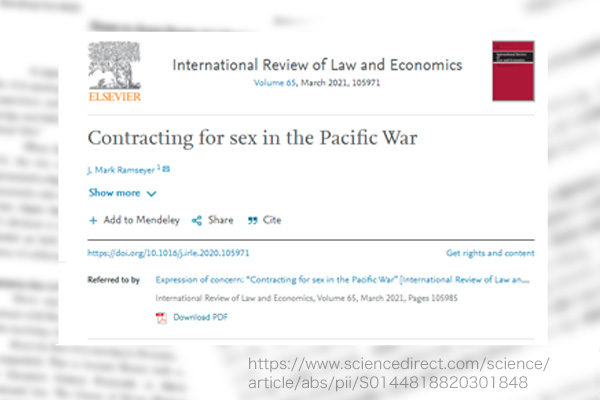Harvard Law School Professor J. Mark Ramseyer’s paper titled “Contracting for sex in the Pacific War” has been criticized. The paper has been released in the Internet edition of the International Review of Law and Economics, an international academic journal published by Dutch publishing company Elsevier. It had been planned to be carried by the printed version of the journal in March. According to media reports, however, the publisher has delayed the publication and asked Ramseyer to provide rebuttals to critical comments by some scholars.
Unreasonable demand for the withdrawal of the paper
Criticisms against Ramseyer’s paper mostly fail to comply with minimum rules for academic criticisms: respecting the personal dignity of targets for criticisms, focusing on academic arguments, and taking personal responsibility for criticisms.
For academic arguments, a paper subject to criticisms must remain open to the public. Nevertheless, a large number of scholars are collecting signatures to demand the withdrawal of Ramseyer’s paper. This kind of movement impedes academic progress. Those critics should present their arguments in their names. Any majority vote cannot reverse a truth.
Assuming that wartime comfort women were not sex slaves but contracted prostitutes, Ramseyer’s paper theoretically analyzes details of such contracts. Criticisms against the paper focuses on its failure to prove the existence of written contracts. But there are numerous contracts that are not written on paper. In Japan and Korea during the war, oral contracts were dominant.
Newspaper ads for recruiting comfort women and memorandums written by pay-desk staff at brothels indicate that comfort women or their parents received massive loans from brothel owners and that these women could retire and return home after repaying debt. There were comfort women who were making large remittances to their families after or while repaying loans, as indicated by their bank deposit books and personal notes. Moon Ok Ju, a former South Korean comfort woman, deposited 26,000 yen and remitted 5,000 yen to her family. A Taiwanese comfort woman remitted 24,000 yen to her family. One could buy a house for 1,000 yen at that time in Korea and Taiwan.
Academic debate should replace personal attacks
Most of criticisms against Ramseyer’s paper assume that comfort women were not contracted prostitutes but sex slaves who lost their personal dignity and were owned by some persons. But there are many Japanese and South Korean scholars who assert comfort women were not sex slaves but a kind of registered prostitutes, including Ikuhiko Hata known as a Japanese authority on the comfort women issue, as well as Lee Young Hoon, who authored “Anti-Japan Tribalism,” a bestseller in Japan and South Korea. The Japanese government has also officially denied the sex slave theory.
The theory viewing comfort women as sex slaves is not commonly accepted in academia. Therefore, Ramseyer’s paper has enough raison d’etre as a theory in academia. What is required is academic debate instead of the demand for the withdrawal of the paper or personal attacks.
Tsutomu Nishioka is a senior fellow and a Planning Committee member at the Japan Institute for National Fundamentals and a visiting professor at Reitaku University. He covers South and North Koreas.


